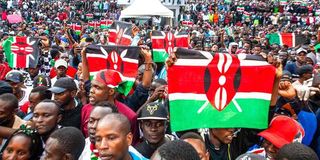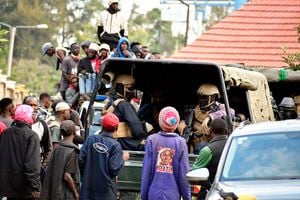
Participants during the Shujaaz Memorial concert held on July 7, 2024 at Uhuru Park in Nairobi.
They say that the highest office in the land is that of citizen, not president. The theory is that all power in the state resides in the citizenry in their individual and corporate guises. It’s to say the state doesn’t have power of its own, even in a dictatorship, let alone a democracy. The reason is simple. A state properly defined must consist of people, or citizens, a country with defined borders, a government that is able to exercise effective control, and carry out functions of government, including conducting foreign relations. But people – or citizens – are the essential sine qua non for statehood. A government can’t rule over a country without people. That’s why the citizen is the key.
The citizen, however, is the Everyman. Often, the citizen is faceless. To use a recent Kenyanism, the citizen can also be formless and leaderless especially when imagined in the collective sense. It’s in this iteration that the citizen can be anonymous and an Everyman. In English nomenclature, an Everyman is the average Makau or Joe. A person who doesn’t stand out in the crowd. Has no power, or panache. Is indistinguishable from your common villager, or street person. From these mundane descriptions, one might be tempted to poo pooh the citizen as insignificant, or even disposable. Or to refer to the citizen as a sack of potatoes that can be tossed willy nilly hither and thither without consequence.
Individual citizen
The truth is that the foundation of every society and civilisation is the individual citizen. The individual is the foundation on which everything else rises. There is nothing – and nothingness – without the individual citizen. So, when we talk of “masses” we have to be very careful that the masses are in fact the state, if not the backbone of it, for without them the state doesn’t – and can’t – exist. The citizen cannot then be the doormat on which elites walk. In fact, there would be no elites to speak of without the citizen. That’s why the citizen is a sacred being, the heartbeat of civilisation. No polity can endure and flourish without putting the citizen at the centre. Nothing else works.
What’s my point? Our political class lacks an understanding of the place of the citizen, the individual person, in society. We have seen with our own eyes hubris and arrogance and the public display of riches by cabals of elites who act and speak without conscience. They pour scorn and calumny on the populace.
They act as though they were gods. I wonder whether they even know that visiting the bathroom reminds them of their human fallibility and ordinariness. I have seen folks displaying expensive watches and other items of wear in the midst of the penury. To what end, as PS Korir Sing’oei of the Ministry of Foreign Affairs poignantly tweeted recently. Why poke the citizen in the eye?
If you read history carefully, you will realise that it’s political elites who foment revolutions against themselves because of being tone deaf. They forget they are nothing without the Everyman, the Anonymous. They get drunk with power and stolen loot. At the onset of the French Revolution, Marie Antoinette, the Queen Consort and wife to King Louis XVI, is reported to have mocked the starving masses by telling them to “eat cake” if they had no bread. Out of such arrogance was born the French Republic.
Worst enemies
I write this because our elites are their own worst enemies. They’ve no sense of proportion. They flaunt high-end vehicles and other luxury goods to a population that’s living on less than a dollar a day.
Kenya’s elites need to stop treating citizens as though they are invisible gremlins who must be spat on. We need to understand there are no disposable people. We are all equal in our dignity as human beings. Our intrinsic worth is the same no matter our gender, identity, social status, or religion among other distinctions. No one is above, or below, the law. It doesn’t matter whether one is illiterate, or has acquired a PhD. No qualification can make one more human than the other. It’s those masses who are “anonymous” who make Kenya a beautiful country. They are the ones who produce our sons and daughters, including those incredible stars who make us shine at the Olympics.
Let me end where I started. I don’t know about what your views are on human mortality. But I have news for you. You will not live for an eternity. Most of us will be lucky to live to be 100. The human body is one of the most useless vessels. You can be here today and gone tomorrow. And we will forget about you as soon as you depart because life must go on. So, even at the most temporal and empirical level, understand that from dust you came, and to dust you shall return. Be humble. Don’t be an ignorant show-off. Respect Anonymous.
Prof Mutua is SUNY Distinguished Professor and Margaret W. Wong Professor at Buffalo Law School, The State University of New York. @makaumutua.










